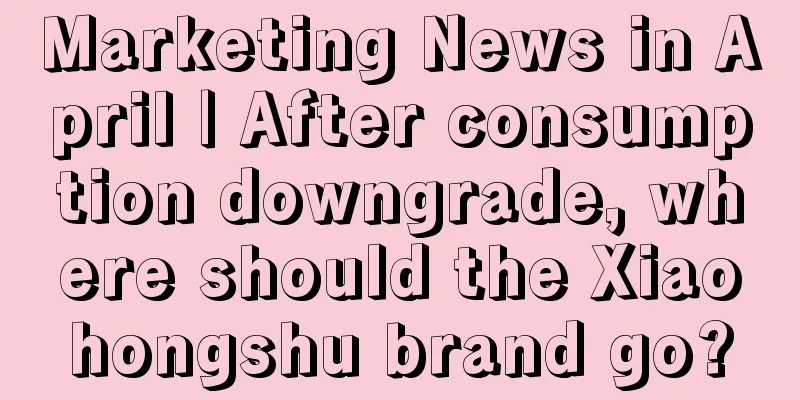Kudi Coffee, which is trying to copy Luckin Coffee, needs to improve its product strength and strengthen its brand marketing

Recently, when I was browsing Douyin, I always saw advertisements for "Luckin's new brand Kudi Coffee" and "Luckin opened a new store". When I opened the group purchase, the categories and prices were very similar to Luckin. A large number of food blogger accounts were crazy about the ads, and when I opened the comments, I saw that almost all of them were water armies. I am a little puzzled. There is no need for Luckin to copy itself. After searching for information, I found that Kudi Coffee and Luckin Coffee are not the same company. It should be that Kudi is copying Luckin’s marketing. Why does Kudi dare to engage in such blatant false advertising? Isn’t he afraid of Luckin Coffee’s rights protection or consumer complaints? This aroused the author's interest. After research, it was found that Kudi has reaped great rewards by scamming Luckin Coffee, but if it wants to go further, it needs to work harder on improving product strength and strengthening brand marketing. The author went to an offline Kudi Coffee store and found that it was less than 100 meters away from Luckin Coffee. Its overall decoration style is similar to Luckin Coffee, but it is mainly black and white with orange embellishments. The menu of the store displays classic coffee, oatmeal series, raw coconut series, tea, smoothies, snacks and desserts, which are obviously replicas of Luckin's product line. The raw coconut latte and thick milk latte are all familiar. In terms of pricing, the price of coffee is between 20 and 32 yuan. During the trial operation, all products are priced at 9.9 yuan. Invite friends to place orders and get a 0 yuan coffee coupon. All of this is very similar to Luckin Coffee in its early days. So what is the relationship between Cotti Coffee and Luckin Coffee? According to self-media articles available online (should be Cotti's PR soft articles), it is Cotti Coffee, a coffee brand launched by former Luckin founder Lu Zhengyao. In addition, Tianyancha APP shows that Cotti Coffee Co., Ltd. was established in Hong Kong in 2021 and holds 100% of Cotti Coffee (Tianjin) Co., Ltd. and Cotti Coffee (Beijing) Co., Ltd. The legal representatives of the three companies are Qian Zhiya. It should be pointed out that Qian Zhiya is also the former founder of Luckin Coffee. However, Tianyancha also shows that Luckin and Cotti have no equity relationship and are two completely different companies. Therefore, Luckin and Cotti have nothing to do with each other. It's just that Luckin's founding team started a new business to create the Cotti brand. This is probably the logic behind Kudi Coffee's attempt to promote itself as a sub-brand of Luckin Coffee, hoping to "steal" some uninformed consumers by using its brand. Perhaps out of consideration for its former boss, Luckin Coffee has not yet taken legal action against Kudi Coffee for its improper promotion. Putting aside the question of whether it is appropriate to commit fraud, has Cudi's hard work in marketing achieved any good results? According to the data disclosed to the media, during the "100 Cities and 1,000 Stores Coffee Carnival" in February, Douyin's group purchase of 8.8 yuan all-you-can-drink coupons sold more than 1.53 million units in two weeks, and subsequent sales are still soaring, which seems to be a good result. In addition to group purchase ads, Kudi Coffee also put a large number of franchise ads on Douyin, apparently trying to quickly gain market share through franchises. It is said that Kudi Coffee has 1,300 stores nationwide in less than 4 months since its establishment, and has even announced that it will open 10,000 stores in three years. Cudi's bright future seems to be just around the corner. However, is Kudi Coffee really that good? Perhaps it just looks good. According to the information provided by Kudi Coffee, it costs about 498,000 yuan to join a 40-square-meter Kudi Coffee store, with a gross profit margin of 64%. The investment can be recovered within 12 months, and the fastest is only about 1 month. However, a restaurant chain researcher said that it usually takes 18 months for a restaurant franchise to pay back. Based on the 12-month payback mentioned by Cuddy, the daily turnover of a single store must be at least 5,000 yuan. This may be achievable for a mature brand like Luckin Coffee, but it is difficult for new entrants into the coffee market. Although according to Kudi's data, some stores in Fuzhou can achieve an average daily sales of more than 1,000 cups, which can pay back the investment in half a year, it remains to be seen whether every store can achieve such high daily sales and whether it can be sustained in the long term. Some bloggers also counted the daily sales of Kudi Coffee and Luckin Coffee, which are next to each other, and found that the former is only less than a quarter of the latter. Considering the high cost of brand promotion, it is difficult for the profit of a single store to maintain such a high level of 64%. Industry insiders are skeptical about the franchise income promised by Kudi Coffee and are also worried about its future development prospects. Returning to the essence of brand success, it is inseparable from product strength and brand marketing. The first thing that Kudi Coffee should focus on is how to quickly improve product strength and make continuous improvements. At present, the classic coffee, oatmeal series, raw coconut series, tea and smoothies on the Kudi menu are mostly copied from the hits of Luckin and other brands. There is no difference in the classic products, and there is a lack of its own innovative hits. As for the quality of coffee, its classic coffee series uses the "Sirius" and "Comet" coffee beans that won the IAC Gold Award. For personal taste, the quality of American coffee is not bad. However, a cup of bergamot citrus Qingku ice extract made me doubt my life. The flavor is too strange. Of course, this has a lot to do with personal preference. Judging from the relatively real content on platforms such as Xiaohongshu and Bilibili, consumers' evaluation of Kudi coffee products is also polarized. Luckin Coffee also competed with Starbucks, a coffee giant, with its classic products made from selected coffee beans, and then created innovative hot products such as sparkling coffee, raw coconut latte, and raw cheese latte, which won the recognition of many coffee lovers and attracted many people to join the ranks of coffee consumers. The competition in the catering industry is very fierce. If the quality and flavor cannot be guaranteed, it will be difficult to retain consumers. And it is difficult for a catering brand without hot products to become a successful brand. In terms of marketing, it remains to be seen whether Kudi Coffee’s strategy of completely imitating Luckin Coffee will be effective. If it wants to “surpass its predecessor,” it needs to continue to work hard on strengthening its brand positioning and powerful brand marketing. At present, there is no obvious differentiated marketing strategy for Kudi, which is almost a copy of Luckin Coffee. Kudi attracts consumers through low prices and free drink coupons, and occupies the market by spending a lot of money. This is exactly the same as Luckin Coffee's early customer development strategy. It can achieve good results in the short term, but it undoubtedly also brings huge financial pressure and other operating costs. At present, China's coffee consumption market has been opened, and both new and old coffee brands are actively expanding their territory. According to data from Zhaimen Canyan, Luckin Coffee alone added 2,939 new stores last year, followed by Lucky Coffee with 1,521 new stores, McCafé with 763 new stores, and Starbucks with 763 new stores. Unlike Luckin Coffee, which only opened direct stores in first- and second-tier cities in the early days and expanded its market share in the sinking markets of third- and fourth-tier cities through franchising after the brand was relatively mature, Kudi adopted a franchise model to expand rapidly from the beginning. Kudi may want to emulate Luckin Coffee's idea of quickly occupying the market, but the current coffee market is different from when Luckin Coffee was dominating the market. Competition is more intense. How to maintain profits in the sinking market with higher risks is even more difficult, which puts higher requirements on its ability to strengthen store operation support and enhance brand influence. In terms of brand marketing, Kudi has a longer way to go. First of all, Kudi must clarify its market positioning and brand positioning. Although it has a name like coffee, its current operating brands are not limited to coffee, but also tea drinks and meals. It even hopes to try to create a "day coffee and night wine" consumption scene, hoping to make efforts through the combination of coffee + Western food + bar. If it is a coffee business, it will make the product to the extreme. If it is a "full-time dining and leisure business", it will strengthen the service experience and scene culture, so that customers can recognize the Kudi brand and make a clear choice based on their own needs, instead of not knowing what to consume when they see Kudi. Secondly, Kudi needs to carry out brand marketing more vigorously to create a distinctive brand tone and unique brand culture and gain its own loyal consumers. After acquiring the first batch of consumer customers, Luckin Coffee continued to hone its product quality, leveraged social media to achieve customer fission, and used celebrity endorsements, joint marketing, and viral events to enhance brand influence and establish differentiated brand recognition. After the brand became relatively mature, it paid more attention to building brand culture and strengthening the membership system, gaining a large number of loyal fans, and its marketing power is remarkable. During the World Cup, Kudi sponsored the Argentine team in an attempt to create a high-end image, but it seems that it failed to break through the circle and had limited impact on target customers. In addition to frantically advertising on Douyin to achieve low-cost customer acquisition, in Kudi's recent carnival activities, we saw that it invited celebrities such as Liu Yan and Zhang Jike to participate in marketing activities, hoping to create a young and fashionable brand characteristic. This is a manifestation of its active increase in brand marketing. However, from the current performance, these marketing actions have limited effects and it is still difficult to establish a close connection between consumers and brands. The road to building a brand is long and arduous. After quickly gaining basic customers by copying Luckin Coffee, Cudi still needs to work hard on how to retain customers through brand marketing. Author: Chen Hao; WeChat public account: Brand Market Relativity (ID: Brand-Marketing) |
<<: How long is the shelf life of the “price-increasing medicine” of long videos?
>>: How to make money by telling stories on Douyin?
Recommend
Where can I see the Amazon video review pass? Are there any requirements?
When Amazon merchants upload products, they can di...
It’s been three years, why is Holiland still doing joint brands?
In recent years, Holiland has become famous on soc...
How to extend Amazon Outlet promotion? How to set it up?
Amazon Outlet, which clears out inventory at price...
What does Amazon Prime Day mean? How to improve the registration pass rate?
If Amazon merchants want to attract traffic to the...
What exactly are we talking about when we talk about private domain?
As public domain traffic becomes increasingly diff...
Compared to physical products that are easy to go viral, how can “online products” create social currency?
The social currency of a brand is a tool for forgi...
Different ways to get traffic from Xiaohongshu's discovery page and search page
As a popular social platform, Xiaohongshu provides...
I was so amused by the copywriting of these zoos
This article will take you to appreciate some crea...
What is the Amazon Returns Service Provider Program and what are the benefits of joining?
In fact, the US site launched the Return Service P...
What should I pay attention to when doing Xiaohongshu spotlight advertising for the first time?
For first-time merchants, how to avoid blind inves...
Video account Double 11 incentive policy is here
Double 11 is coming, and many platforms have annou...
When doing data analysis, keep this underlying logic in mind!
"The key to revealing the underlying logic of...
Tea and coffee shops are eyeing young people’s breakfast
Milk tea and coffee are the "life-saving reme...
How is it for a novice seller to enter Amazon? How much money can a novice seller usually make on Amazon?
For new sellers, they are often curious and confus...
Why are variety shows targeting short dramas?
As the short drama market continues to be hot, lon...









